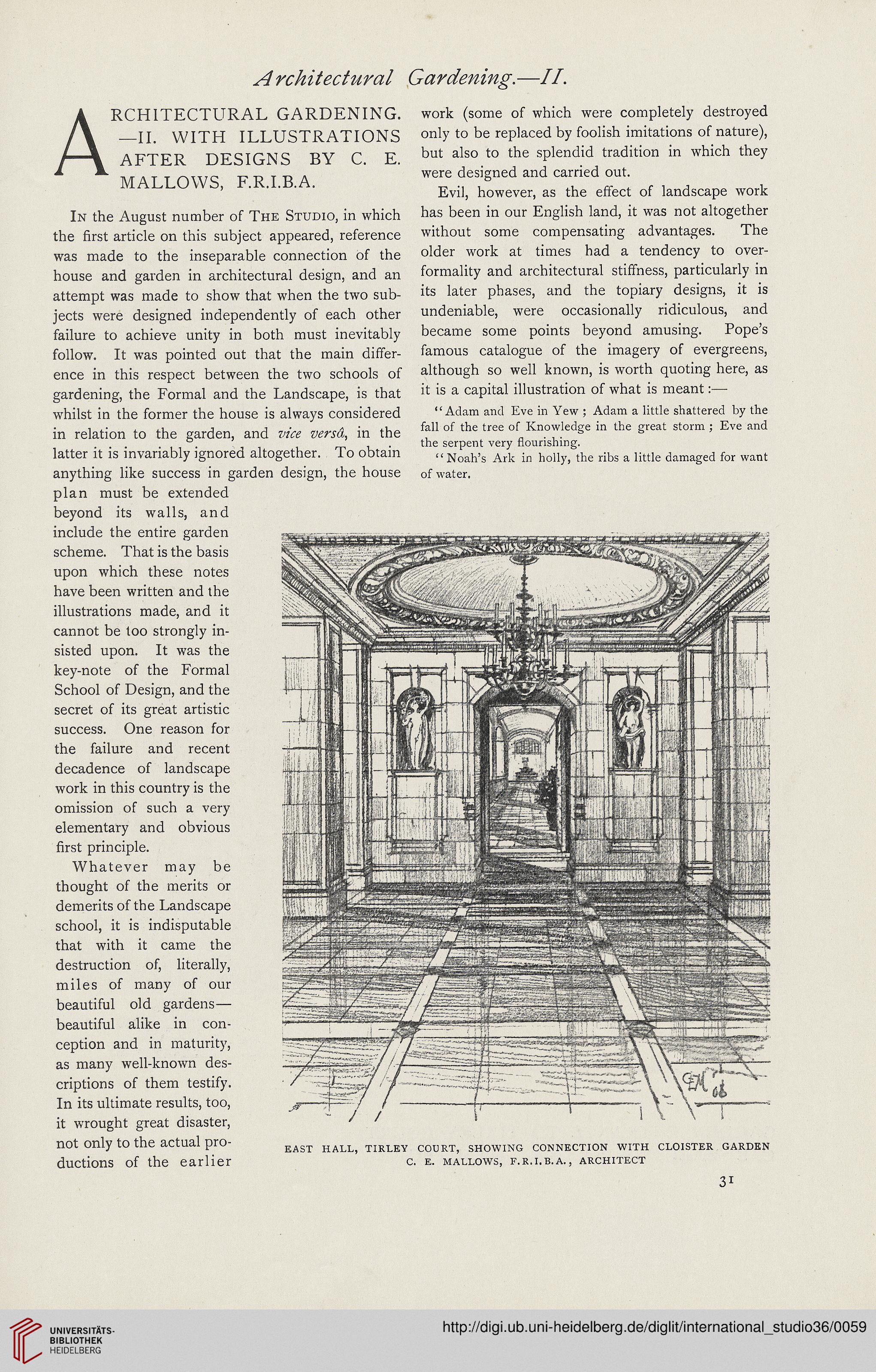A RCHITECTURAL GARDENING.
/\ —II. WITH ILLUSTRATIONS
\ AFTER DESIGNS BY C. E.
MALLOWS, F.R.I.B.A.
IN the August number of THE STUDio, in which
the hrst article on this subject appeared, reference
was made to the inseparable connection of the
house and garden in architectural design, and an
attempt was made to show that when the two sub-
jects were designed independently of each other
failure to achieve unity in both must inevitably
follow. It was pointed out that the main differ-
ence in this respect between the two schools of
gardening, the Formal and the Landscape, is that
whilst in the former the house is always considered
in relation to the garden, and wyyd, in the
latter it is invariably ignored altogether. To obtain
anything like success in garden design, the house
plan must be extended
beyond its walls, and
include the entire garden
scheme. That is the basis
upon which these notes
have been written and the
illustrations made, and it
cannot be too strongly in-
sisted upon. It was the
key-note ofthe Formal
School of Design, and the
secret of its great artistic
success. One reason for
the failure and recent
decadence of landscape
work in this country is the
omission of such a very
elementary and obvious
hrst principle.
Whatever may be
thought of the merits or
demerits of the Landscape
school, it is indisputable
that with it came the
destruction of, literally,
miles of many of our
beautiful old gardens—
beautiful alike in con-
ception and in maturity,
as many well-known des-
criptions of them testify.
InitsuItimateresults,too,
it wrought great disaster,
notonlytotheactualpro-
ductions of the earlier
—//.
work (some of which were completely destroyed
only to be replaced by foolish imitations of nature),
but also to the splendid tradition in which they
were designed and carried out.
Evil, however, as the effect of landscape work
has been in our English land, it was not altogether
without some compensating advantages. The
older work at times had a tendency to over-
formality and architectural stiffness, particularly in
its later phases, and the topiary designs, it is
undeniable, were occasionally ridiculous, and
became some points beyond amusing. Pope's
famous catalogue of the imagery of evergreens,
although so well known, is worth quoting here, as
it is a capital illustration of what is meant:—
'' Adam and Eve in Yew ; Adam a Iittle shattered by the
fall of the tree of Knowledge in the great storm ; Eve and
the serpent very flourishing.
"Noah's Ark in holly, the ribs a little damaged for want
ofwater.
3i
/\ —II. WITH ILLUSTRATIONS
\ AFTER DESIGNS BY C. E.
MALLOWS, F.R.I.B.A.
IN the August number of THE STUDio, in which
the hrst article on this subject appeared, reference
was made to the inseparable connection of the
house and garden in architectural design, and an
attempt was made to show that when the two sub-
jects were designed independently of each other
failure to achieve unity in both must inevitably
follow. It was pointed out that the main differ-
ence in this respect between the two schools of
gardening, the Formal and the Landscape, is that
whilst in the former the house is always considered
in relation to the garden, and wyyd, in the
latter it is invariably ignored altogether. To obtain
anything like success in garden design, the house
plan must be extended
beyond its walls, and
include the entire garden
scheme. That is the basis
upon which these notes
have been written and the
illustrations made, and it
cannot be too strongly in-
sisted upon. It was the
key-note ofthe Formal
School of Design, and the
secret of its great artistic
success. One reason for
the failure and recent
decadence of landscape
work in this country is the
omission of such a very
elementary and obvious
hrst principle.
Whatever may be
thought of the merits or
demerits of the Landscape
school, it is indisputable
that with it came the
destruction of, literally,
miles of many of our
beautiful old gardens—
beautiful alike in con-
ception and in maturity,
as many well-known des-
criptions of them testify.
InitsuItimateresults,too,
it wrought great disaster,
notonlytotheactualpro-
ductions of the earlier
—//.
work (some of which were completely destroyed
only to be replaced by foolish imitations of nature),
but also to the splendid tradition in which they
were designed and carried out.
Evil, however, as the effect of landscape work
has been in our English land, it was not altogether
without some compensating advantages. The
older work at times had a tendency to over-
formality and architectural stiffness, particularly in
its later phases, and the topiary designs, it is
undeniable, were occasionally ridiculous, and
became some points beyond amusing. Pope's
famous catalogue of the imagery of evergreens,
although so well known, is worth quoting here, as
it is a capital illustration of what is meant:—
'' Adam and Eve in Yew ; Adam a Iittle shattered by the
fall of the tree of Knowledge in the great storm ; Eve and
the serpent very flourishing.
"Noah's Ark in holly, the ribs a little damaged for want
ofwater.
3i





